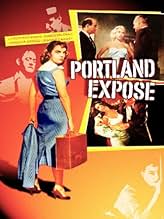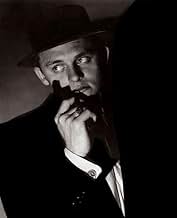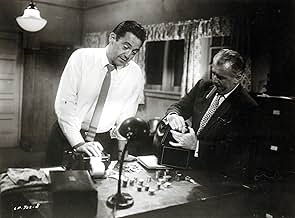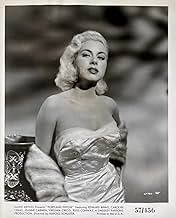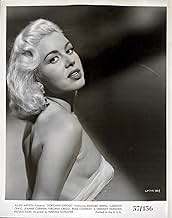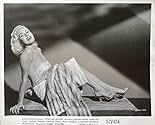Ajouter une intrigue dans votre langueA tavern owner in mid-century Portland, Oregon finds the safety of himself and his family threatened when he becomes involved in a war between labor unions and a violent local crime syndicat... Tout lireA tavern owner in mid-century Portland, Oregon finds the safety of himself and his family threatened when he becomes involved in a war between labor unions and a violent local crime syndicate.A tavern owner in mid-century Portland, Oregon finds the safety of himself and his family threatened when he becomes involved in a war between labor unions and a violent local crime syndicate.
- Réalisation
- Scénario
- Casting principal
Lawrence Dobkin
- Garnell
- (as Larry Dobkin)
Joseph Marr
- Larry
- (as Joe Marr)
Richard Bellis
- Jimmy Madison
- (as Dickie Bellis)
John Alban
- Tavern Patron
- (non crédité)
Albert Cavens
- Tavern Patron
- (non crédité)
Beulah Christian
- Tavern Patron
- (non crédité)
Francis De Sales
- Alfred Grey
- (non crédité)
Kort Falkenberg
- Speed Bromley
- (non crédité)
Stanley Farrar
- Spud Lennox
- (non crédité)
Avis à la une
Bit late for a vintage noir, by definition, and whilst not deeply caste in dark shadows throughout, makes up for this a little on the sleaze front. Competently made and presented as 'based on a true story' this is quite interesting for its detail on organised crime and its involvement at very modest levels with the help of 'rotten apple' police and corrupt union official plus assistance 'all the way to the top'. There are in fact some surprisingly sleazy moments, including a well shot and fairly vigorous attempted rape. There is also a super body disposal scene involving a train at night with the flashing lights of the carriages lighting up the killer's obvious delight. The central character is, however, just a little too much of a 'goodie two shoes' for my liking and the film does slow to a crawl at times when we have to consider the family implications. Worth a watch.
Based on a "True Story" the opening scene features a panoramic view of Portland as the narration extols
the beauty, culture and incredible atmosphere of the city as a wonderful place to raise a family.
Sounds like Paradise but...it seems the town has been overran by murderous rival crime syndicates vying
for control of the lucrative pinball vending business.
Filmed in a semi-documentary style, Portland Expose reveals the sordid, corrupt side of the City of Roses. The movie follows the plight of local barkeeper George Madison (Edward Binns) as he becomes entangled with the criminal underworld after he agrees to have a pinball machine placed in his tavern. Soon the syndicate forces him to place even more machines and his formerly quiet pub becomes a hangout for the 'wrong crowd'. Regretting his decision Madison decides to fight back after his daughter (Carolyn Craig) is attacked in the parking lot by a syndicate thug (Frank Gorshin). With the cooperation of local officials Madison decides to go undercover to gather evidence to expose the rackets.
The movie draws inspiration from the detective exploitation magazines of the era that promised behind the scenes sordid details. The stories were usually presented in a lascivious manner to maximize sensationalism as they followed the crime investigation through the eyes of the investigators. Tame by today's standards, the film pushed the boundaries into the acceptable content of the time. Though it's a fairly typical 1950's matinee programmer, Portland Exposé weaves a pretty fair noirish tale. Gritty and not highly stylized, it features ensemble cast composed of prolific career character actors (Binns, Virginia Gregg, Russ Conway, Lawrence Dobkin, Frank Gorshin, Rusty Lane, Joe Flynn) who manage to make the movie better than might be expected. All in all a watchable B crime flick.
Filmed in a semi-documentary style, Portland Expose reveals the sordid, corrupt side of the City of Roses. The movie follows the plight of local barkeeper George Madison (Edward Binns) as he becomes entangled with the criminal underworld after he agrees to have a pinball machine placed in his tavern. Soon the syndicate forces him to place even more machines and his formerly quiet pub becomes a hangout for the 'wrong crowd'. Regretting his decision Madison decides to fight back after his daughter (Carolyn Craig) is attacked in the parking lot by a syndicate thug (Frank Gorshin). With the cooperation of local officials Madison decides to go undercover to gather evidence to expose the rackets.
The movie draws inspiration from the detective exploitation magazines of the era that promised behind the scenes sordid details. The stories were usually presented in a lascivious manner to maximize sensationalism as they followed the crime investigation through the eyes of the investigators. Tame by today's standards, the film pushed the boundaries into the acceptable content of the time. Though it's a fairly typical 1950's matinee programmer, Portland Exposé weaves a pretty fair noirish tale. Gritty and not highly stylized, it features ensemble cast composed of prolific career character actors (Binns, Virginia Gregg, Russ Conway, Lawrence Dobkin, Frank Gorshin, Rusty Lane, Joe Flynn) who manage to make the movie better than might be expected. All in all a watchable B crime flick.
Portland Express (1957)
Overall, this is often a stilted affair, and it begins and ends with a canned voice-over about Portland, the Oregon city at the center of this unlikely crime scenario. And for people looking for noir, this is not noir at all, though it does have a kind of throwback to some gangster thugs, and there is a good twenty minutes of night stuff that has a noir look.
Portland Express is more about American innocence, and the surprise anachronism of these mobsters in fedoras pressuring a cute roadhouse into using their pinball machines. Which leads to bigger pressures.
The lead man is a small time movie and later t.v. character, Edward Binns, a solid but unexciting actor, sort of perfect for this solid but unexciting town (back then--now I hear it's solid and exciting). And his daughter is a complete unknown who acts her heart out, and really feels like a teenager on the cusp of womanhood in a realistic way. This matters because she becomes central to the plot, including in a harrowing and almost abusive rape scene (it pushes the violence very hard for a movie of this simplicity). But it's a turning point for Binns, the father, and for the plot, as this likable, ordinary family man goes undercover to get the bad guys.
Naturally, we root for him, and see the dismantling of the syndicate. It gets increasingly dark and desperate over time, and a bit unlikely, but you'll still want to watch to the end, when the cavalry arrives--a group of ordinary men in plaid shirts who rush in to save the day. It's not as hilarious as it sounds. There is a quality of really beautiful, ordinary middle-America here that resonates, and that helps show this is really a 1950s movie. It's widescreen black and white, and a genuine slice of its period.
Overall, this is often a stilted affair, and it begins and ends with a canned voice-over about Portland, the Oregon city at the center of this unlikely crime scenario. And for people looking for noir, this is not noir at all, though it does have a kind of throwback to some gangster thugs, and there is a good twenty minutes of night stuff that has a noir look.
Portland Express is more about American innocence, and the surprise anachronism of these mobsters in fedoras pressuring a cute roadhouse into using their pinball machines. Which leads to bigger pressures.
The lead man is a small time movie and later t.v. character, Edward Binns, a solid but unexciting actor, sort of perfect for this solid but unexciting town (back then--now I hear it's solid and exciting). And his daughter is a complete unknown who acts her heart out, and really feels like a teenager on the cusp of womanhood in a realistic way. This matters because she becomes central to the plot, including in a harrowing and almost abusive rape scene (it pushes the violence very hard for a movie of this simplicity). But it's a turning point for Binns, the father, and for the plot, as this likable, ordinary family man goes undercover to get the bad guys.
Naturally, we root for him, and see the dismantling of the syndicate. It gets increasingly dark and desperate over time, and a bit unlikely, but you'll still want to watch to the end, when the cavalry arrives--a group of ordinary men in plaid shirts who rush in to save the day. It's not as hilarious as it sounds. There is a quality of really beautiful, ordinary middle-America here that resonates, and that helps show this is really a 1950s movie. It's widescreen black and white, and a genuine slice of its period.
"Portland Exposé" follows a tavern owner in Portland, Oregon in the mid-20th-century who finds himself a linchpin to a crime syndicate's gambling racket after installing their pinball machines in his business. His attempts to overthrow them endanger the life of himself and his family.
This low-budget film noir is one of the more slick, gritty, and iron-fisted out there, but it's unfortunately been largely forgotten. It's a B-movie through and through, and while it does suffer some pacing issues and a lack of development, it is at times surprisingly shocking. It depicts rape attempts (including a preemptory one from a teenage girl's boyfriend), and other types of violence that are a bit shocking given the time it was made. It also depicts prostitution in a manner that is frank, reminiscent of how the subject is treated in pre-Code films like "The Story of Temple Drake."
Based on a series of crimes committed by real-life kingpin Jim Elkins, the screenplay never really fleshes out the inner workings of the syndicate or how exactly all of this ties together in the context of the labor unions, and that is probably its biggest trouble. At a quick-paced 72 minutes, there is not sufficient time to elucidate all of this. Where the film makes up for it is in its photography and acting, particularly that of Edward Binns as the tavern proprietor, Virginia Gregg as his concerned wife, and genre favorite Carolyn Craig (probably best known for her role in the original "House on Haunted Hill") as their tormented teenage daughter. All of the acting is surprisingly believable, and the scenarios pack a further punch because of it. The film possesses a borderline-documentary style that recalls 1955's "Kiss Me Deadly," though this film is far less surreal.
All in all, "Portland Exposé" is a solid film noir/thriller that largely succeeds on the basis of its performances and overall tone. It's a dark and gritty film noir, and has a certain kind of bitterness about it that makes it memorable even though it has narrative shortcomings. 7/10.
This low-budget film noir is one of the more slick, gritty, and iron-fisted out there, but it's unfortunately been largely forgotten. It's a B-movie through and through, and while it does suffer some pacing issues and a lack of development, it is at times surprisingly shocking. It depicts rape attempts (including a preemptory one from a teenage girl's boyfriend), and other types of violence that are a bit shocking given the time it was made. It also depicts prostitution in a manner that is frank, reminiscent of how the subject is treated in pre-Code films like "The Story of Temple Drake."
Based on a series of crimes committed by real-life kingpin Jim Elkins, the screenplay never really fleshes out the inner workings of the syndicate or how exactly all of this ties together in the context of the labor unions, and that is probably its biggest trouble. At a quick-paced 72 minutes, there is not sufficient time to elucidate all of this. Where the film makes up for it is in its photography and acting, particularly that of Edward Binns as the tavern proprietor, Virginia Gregg as his concerned wife, and genre favorite Carolyn Craig (probably best known for her role in the original "House on Haunted Hill") as their tormented teenage daughter. All of the acting is surprisingly believable, and the scenarios pack a further punch because of it. The film possesses a borderline-documentary style that recalls 1955's "Kiss Me Deadly," though this film is far less surreal.
All in all, "Portland Exposé" is a solid film noir/thriller that largely succeeds on the basis of its performances and overall tone. It's a dark and gritty film noir, and has a certain kind of bitterness about it that makes it memorable even though it has narrative shortcomings. 7/10.
Edward Binns stars in this B movie about a tavern owner in Portland who is offered a jukebox, a pinball machine, and a slot machine to install.
However, a tough syndicate takes over the area and begins controlling the business, turning it into a hard-core gambling establishment that includes B girls.
At first, family man George Madison goes along after his family is threatened. However, one night, a thug that likes jail bait (Frank Gorshin) nearly rapes his daughter (Carolyn Craig). Madison sends his family away and agrees to go undercover, wearing a wire.
Nothing special, the underdog against a crime syndicate. However, it does show a wholesome American '50s family up against the sleazeballs. It's also fairly gritty.
The story is based on Portland crime boss Big Jim Elkins.
Jeanne Carmen, purportedly a close confidant of Marilyn Monroe, does a terrific job as the B girl who exposes Madison as undercover. Carmen claimed knowledge of Monroe and the Kennedys.
After the death of Monroe, Jimmy Rosselli, who worked for Sam Giancana, told get to leave Hollywood as her life was in danger. She lived incognito for over a decade. However, her stories have been questioned and denied by those who knew Monroe.
However, a tough syndicate takes over the area and begins controlling the business, turning it into a hard-core gambling establishment that includes B girls.
At first, family man George Madison goes along after his family is threatened. However, one night, a thug that likes jail bait (Frank Gorshin) nearly rapes his daughter (Carolyn Craig). Madison sends his family away and agrees to go undercover, wearing a wire.
Nothing special, the underdog against a crime syndicate. However, it does show a wholesome American '50s family up against the sleazeballs. It's also fairly gritty.
The story is based on Portland crime boss Big Jim Elkins.
Jeanne Carmen, purportedly a close confidant of Marilyn Monroe, does a terrific job as the B girl who exposes Madison as undercover. Carmen claimed knowledge of Monroe and the Kennedys.
After the death of Monroe, Jimmy Rosselli, who worked for Sam Giancana, told get to leave Hollywood as her life was in danger. She lived incognito for over a decade. However, her stories have been questioned and denied by those who knew Monroe.
Le saviez-vous
- AnecdotesFinal film of Lea Penman.
- ConnexionsFeatured in WatchMojo: Top 10 Movies Banned ONLY in America (2022)
Meilleurs choix
Connectez-vous pour évaluer et suivre la liste de favoris afin de recevoir des recommandations personnalisées
- How long is Portland Exposé?Alimenté par Alexa
Détails
- Date de sortie
- Pays d’origine
- Sites officiels
- Langue
- Aussi connu sous le nom de
- Portland Expose
- Lieux de tournage
- Société de production
- Voir plus de crédits d'entreprise sur IMDbPro
- Durée
- 1h 12min(72 min)
- Couleur
- Rapport de forme
- 1.85 : 1
Contribuer à cette page
Suggérer une modification ou ajouter du contenu manquant


